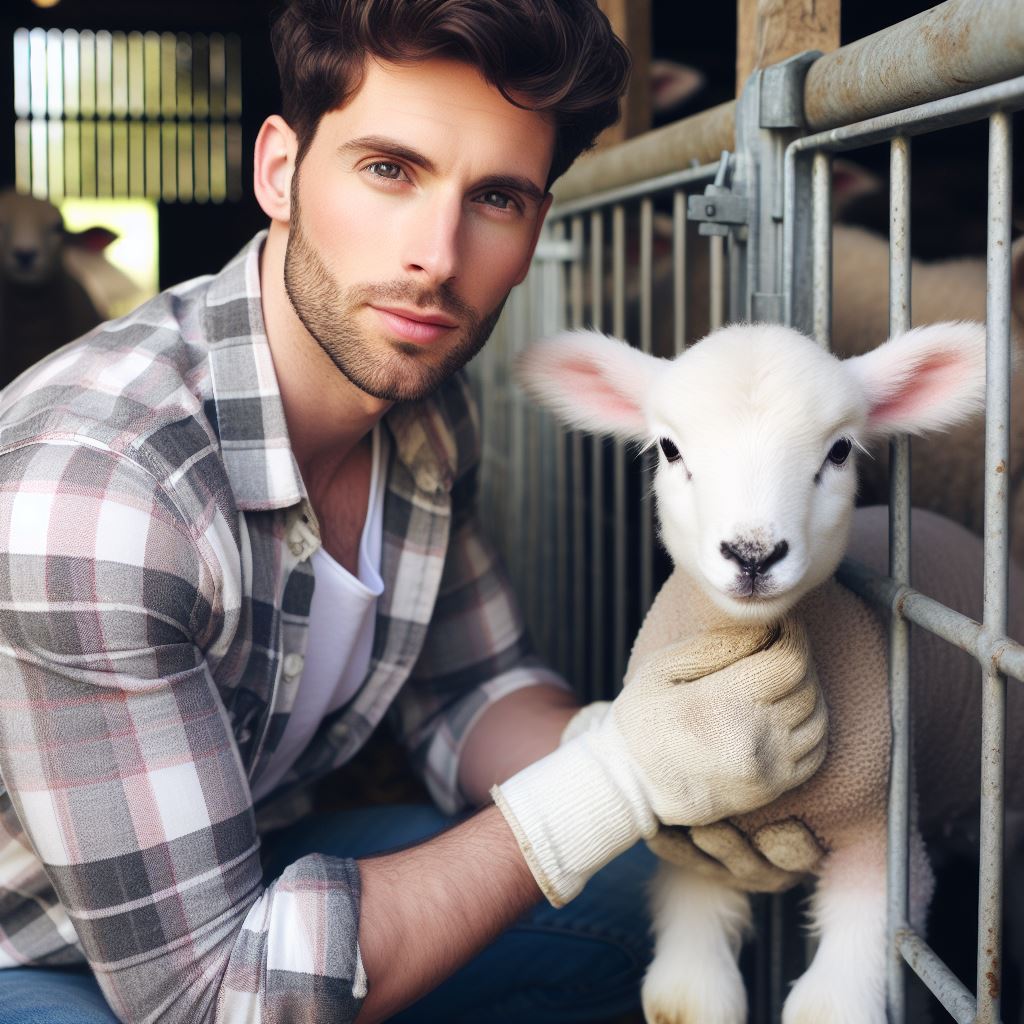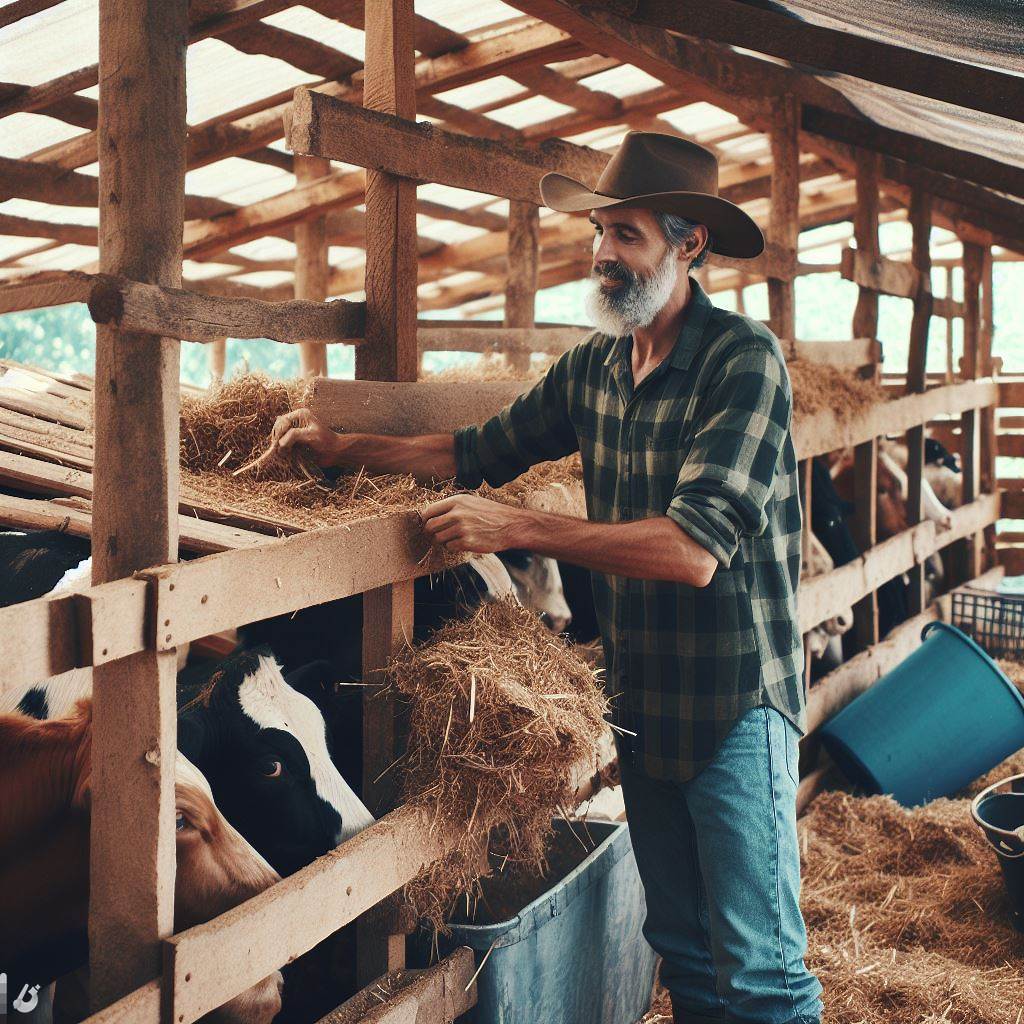Introduction
Proper nutrition is essential for the well-being and productivity of goats.
It plays a crucial role in their overall health and affects their growth, reproduction, and milk production.
Understanding the nutritional needs of goats is vital for farmers and herd owners to ensure optimal herd management.
Importance of proper nutrition for goats
Goats have specific nutrient requirements that need to be met to maintain good health and prevent nutrient deficiencies or imbalances.
Proper nutrition not only enhances their immune system but also improves their resistance to diseases and parasites.
It also affects the quality and quantity of milk produced by dairy goats.
Brief overview of goat nutrition
Goats are ruminant animals, meaning they have a complex digestive system that allows them to efficiently utilize fibrous plant material.
Their diet should consist of a balance of carbohydrates, proteins, fats, vitamins, and minerals.
The main components of their diet include forage, concentrates, and supplements.
Forage, such as pasture or hay, should make up the majority of a goat’s diet. It provides essential nutrients and promotes healthy digestion.
Concentrates, such as grains, provide additional energy and protein.
Supplements, like minerals and vitamins, help meet specific nutritional needs that may be lacking in their diet.
Understanding the nutritional requirements of goats is crucial for maintaining a healthy and productive herd.
By providing a balanced diet that meets their specific needs, goats can thrive and contribute to the success of a goat farm or herd.
Basic nutritional needs of goats
Goats have basic nutritional needs that must be met to ensure their health and productivity.
Transform Your Agribusiness
Unlock your farm's potential with expert advice tailored to your needs. Get actionable steps that drive real results.
Get StartedThese needs include:
Water Requirements
Goats need access to clean and fresh water at all times.
They require approximately 0.5 to 1 gallon of water per day, depending on the environmental conditions.
Energy Needs
Goats get energy from carbohydrates found in their diet, which comes from forages and grains.
It is essential to provide them with a balanced diet to meet their energy requirements.
High-quality forages such as alfalfa, clover, and grasses should be included in their diet.
Protein Requirements
Protein is crucial for growth, reproduction, and maintenance of body functions in goats.
Adequate protein is necessary for milk production and kids’ development.
Legumes like alfalfa and legume hays are excellent sources of protein for goats.
Mineral and Vitamin Needs
Goats require minerals like calcium, phosphorus, sodium, potassium, and magnesium.
These minerals can be provided through proper supplementation or providing access to salt blocks.
Goats also need vitamins A, D, and E, which can be obtained from fresh forages and sunlight exposure.
Meeting the nutritional needs of your goat herd is essential to promote their overall health and productivity.
To accomplish this, you should:
- Provide a well-balanced diet that includes a variety of high-quality forages and grains.
- Ensure access to clean and fresh water at all times.
- Regularly test your goat’s forage to assess its nutritional content and make necessary adjustments.
- Supplement their diet with minerals and vitamins, as recommended by a veterinarian or nutritionist.
- Monitor the body condition score of your goats to ensure they are neither underweight nor overweight.
- Observe and respond to any signs of nutrient deficiencies or imbalances, such as poor growth or reduced milk production.
- Avoid sudden changes in diet as it can cause digestive upsets and negatively impact goat health.
- Consider the specific nutritional needs of pregnant or lactating goats and adjust their diet accordingly.
In general, understanding and meeting the basic nutritional needs of goats is vital to their overall health and well-being.
Providing a balanced diet, adequate water, and essential minerals and vitamins will ensure their productivity and longevity.
Regular monitoring and consulting with experts will help optimize your goat herd’s nutrition.
Read: Managing Goat Health: Disease & Prevention
Types of forage for goats
Goats need a variety of forage to meet their nutritional needs.
Here are three types of forage that are essential for a goat’s diet:
Pasture grasses
Goats are natural grazers and thrive on a diverse range of pasture grasses.
Some common options include Bermuda grass, ryegrass, fescue, and clover.
These grasses provide essential nutrients, fiber, and energy for goats.
Hay
Hay is a staple forage for goats, especially during the winter months or when pasture availability is limited.
Showcase Your Farming Business
Publish your professional farming services profile on our blog for a one-time fee of $200 and reach a dedicated audience of farmers and agribusiness owners.
Publish Your ProfileGood quality hay should be green, leafy, and free from mold or dust.
Popular choices include timothy, alfalfa, and orchard grass.
Offering hay in racks or feeders prevents wastage and provides mental stimulation for the herd.
Silage
Silage is fermented forage stored in airtight conditions, which preserves its nutritional value.
Common silage options for goats include corn, grass, and legume silage.
Silage offers high-energy content and is particularly beneficial for pregnant and lactating does or growing kids.
Including a variety of forages in a goat’s diet ensures a balanced intake of essential nutrients.
Here are some additional factors to consider:
Nutritional requirements
Different stages of a goat’s life require specific nutrients.
For example, lactating does and growing kids have higher protein and energy requirements compared to adult goats.
Adjust the forage types and quantities accordingly.
Forage quality
The nutritional content of forages can vary depending on factors such as soil health, climate, and stage of growth.
Regularly test your forages for protein, energy, and mineral content to ensure they meet the herd’s needs.
Rotational grazing
Rotational grazing involves dividing pasture into sections and regularly moving goats to fresh areas.
This practice promotes even forage utilization, prevents overgrazing, and allows pastures to regenerate naturally.
Supplementation
In addition to forage, goats may require supplementation to meet their nutritional needs.
Consult with a veterinarian or livestock nutritionist to determine if additional minerals, vitamins, or protein concentrates are necessary for your herd.
Water availability
Along with forage, providing clean and fresh water to goats is essential.
Regularly check water sources and ensure they are easily accessible for the entire herd.
Remember, each goat is unique, and their forage requirements may differ based on their age, breed, health, and production goals.
Regular monitoring of their body condition, weight, and overall health helps ensure their nutritional needs are being met.
In essence, a well-balanced diet for goats includes a variety of forages such as pasture grasses, hay, and silage.
These forages provide the necessary nutrients, fiber, and energy for goats at different stages of their lives.
Consider factors like nutritional requirements, forage quality, rotational grazing, supplementation, and water availability to support the overall health and well-being of your goat herd.
Feeding Considerations for Lactating Goats
Lactating goats have increased energy and protein requirements; ensuring their proper nutrition is crucial for their health and milk production.
Here are some key things to consider when feeding lactating goats:
Increased Energy Requirements
Lactating goats need more energy to support milk production and meet their own maintenance needs.
As a result, their diet should consist of energy-rich feeds such as grains, haylage, and legumes.
Increased Protein Requirements
To produce high-quality milk, lactating goats require adequate amounts of protein in their diet.
Including protein-rich sources like soybean meal, alfalfa, and clover in their feed can help meet their increased protein needs.
Importance of Calcium and Phosphorus
Calcium and phosphorus play essential roles in milk production, bone development, and overall health.
Lactating goats need these minerals in balanced ratios, ideally provided through good quality forages, mineral supplements, or feed concentrates.
Balanced Diet
Ensuring a balanced diet is crucial for lactating goats.
Providing a mix of grains, forages, and protein supplements can help meet their nutritional requirements.
Consult a goat nutritionist to develop a suitable diet plan for your herd.
Adequate Forage
Providing sufficient amounts of good quality forage is vital for lactating goats.
Fresh pasture, hay, or haylage can offer fiber, vitamins, and minerals required for their optimal health and milk production.
Water Accessibility
Lactating goats need access to clean, fresh water at all times.
Water is vital for digestion, milk production, and overall hydration.
Ensure that water sources are easily accessible and regularly checked.
Showcase Your Farming Business
Publish your professional farming services profile on our blog for a one-time fee of $200 and reach a dedicated audience of farmers and agribusiness owners.
Publish Your ProfileMonitor Body Condition
Frequent monitoring of a lactating goat’s body condition is necessary to ensure she is neither undernourished nor over-conditioned.
Adjusting feed quantities or composition as needed can help maintain a healthy body condition.
Avoid Overfeeding Grains
While grains are an essential energy source, overfeeding them can lead to health issues like ruminal acidosis in lactating goats.
Always ensure an appropriate balance between forage and grains in their diet.
Mineral and Vitamin Supplements
To provide essential micronutrients, consider offering a mineral and vitamin supplement tailored specifically for lactating goats.
These supplements can help prevent deficiencies and support optimal milk production.
Frequent Feedings
Lactating goats have smaller rumen capacities due to the pressure exerted by their enlarged udders.
To ensure optimal digestion and nutrient absorption, divide their daily feed into multiple smaller meals.
Remember, lactating goats have unique nutritional requirements that differ from dry does or growing kids.
Providing them with a well-balanced diet and monitoring their health regularly will help ensure their overall well-being and productive milk supply.
Consult with a professional goat nutritionist for specific feeding recommendations tailored to your herd’s needs.
Common Nutritional Deficiencies in Goats
Goats, like any other livestock, require a balanced diet to maintain their health and productivity.
However, there are certain nutritional deficiencies that can occur in goats, impacting their overall well-being.
Understanding these common deficiencies is crucial in order to prevent them and ensure the proper nutrition of your herd.
Calcium deficiency
Symptoms
Weakness, muscle tremors, reduced appetite, and difficulty walking.
Consequences
Poor bone development, milk fever, and weakened immune system.
Prevention and treatment
- Provide a mineral supplement containing calcium and vitamin D.
- Offer quality forage and provide access to clean water at all times.
Phosphorus deficiency
Symptoms
Loss of appetite, decreased weight gain, and reduced fertility.
Consequences
Weak bones, poor growth, and decreased milk production.
Prevention and treatment
- Offer a mineral supplement with phosphorus.
- Provide a balanced diet rich in phosphorus, such as legumes and grains.
Copper deficiency
Symptoms
Anemia, poor growth, rough hair coat, and loss of fertility.
Consequences
Reduced immunity, digestive disorders, and bone abnormalities.
Prevention and treatment
- Administer a copper supplement according to your veterinarian’s recommendations.
- Ensure goats have access to a variety of forages and avoid feeding them diets high in molybdenum and sulfur.
Vitamin A deficiency
Symptoms
Night blindness, poor growth, rough coat, and respiratory issues.
Consequences
Decreased immune function, increased susceptibility to diseases, and reproductive problems.
Prevention and treatment
- Offer hay and forage rich in beta-carotene.
- Provide a mineral supplement containing vitamin A, but avoid over-supplementing.
Selenium deficiency
Symptoms
White muscle disease, impaired growth, weak immune system, and infertility.
Consequences
Infertility, stillbirths, weak kids, and increased susceptibility to diseases.
Prevention and treatment
- Provide a selenium supplement based on soil deficiency in your area.
- Consult with a veterinarian for accurate dosage.
It is important to understand that nutrition deficiencies can have severe consequences in goats.
Proper prevention and treatment are key to maintaining a healthy herd.
In addition to the deficiencies mentioned above, it is crucial to ensure a well-balanced diet for goats.
This includes providing them with good-quality forage, such as pasture grasses and legumes, as well as a mineral supplement specifically formulated for goats.
Regular monitoring of your goat’s body condition and consulting with a veterinarian can help identify any nutritional deficiencies early on.
Remember, preventing deficiencies is cheaper and easier than treating them, so investing in proper nutrition is essential for the overall well-being and productivity of your goat herd.
Supplementary feeding options for goats
- Forage supplementation: Offer high-quality forage such as alfalfa, clover, or browse to meet their nutritional needs.
- Hay: Provide good-quality hay to ensure a balanced diet, especially during the winter months when fresh forage may be scarce.
- Silage: Preserve green forages as silage, providing goats with a nutrient-rich feed option throughout the year.
- Grazing management: Rotate pastures to allow goats access to fresh forage and prevent overgrazing.
Grain and concentrate feeds
- Corn: A common grain choice, corn provides energy due to its high carbohydrate content.
- Barley: Considered a nutritious grain for goats, barley offers a good source of protein and energy.
- Soybean meal: An excellent source of protein, soybean meal can be used to supplement goat diets.
- Commercial goat feed: Formulated specifically for goats, these feeds are balanced to meet their nutritional requirements.
Considerations for choosing the right feed
- Nutritional content: Assess the feed’s protein, energy, vitamin, and mineral levels to ensure it meets goat requirements.
- Feed availability: Choose feeds that are easily accessible and affordable in your region.
- Age and stage of production: Different feeding requirements exist for growing kids, lactating does, and mature bucks.
- Health and condition: Factors such as pregnancy, illness, or body condition score should be considered when selecting feed options.
Feeding guidelines and recommendations
- Proper rationing: Offer an appropriate amount of feed based on the goat’s weight, age, and activity level.
- Gradual diet changes: Introduce new feeds slowly to prevent digestive upset or metabolic issues.
- Water availability: Ensure fresh, clean water is always accessible to promote proper digestion and overall health.
- Monitor body condition: Regularly assess the goats’ body condition score to adjust feed quantities accordingly.
In summary, providing goats with a balanced diet is essential for their overall health and productivity.
Supplementary feeding options such as forage supplementation, hay, and silage can help fulfill their nutritional needs.
Grain and concentrate feeds like corn, barley, soybean meal, or commercial goat feeds are suitable options for additional energy and protein.
Considerations when choosing the right feed include nutritional content, availability, age and stage of production, as well as the goats’ health and condition.
Following feeding guidelines and recommendations, such as proper rationing and gradual diet changes, will help maintain optimal goat nutrition.
Remember to always monitor their body condition and ensure access to clean water for their well-being.
Read: Sheep & Goat Vaccination Schedules

Specific Considerations for Different Stages of Goat Life
Kids
- Provide a balanced diet rich in protein and energy to support growth and development.
- Offer milk or milk replacer until they are at least 8 weeks old.
- Start introducing solid foods gradually, such as hay, grain, and fresh vegetables.
- Ensure access to fresh, clean water at all times to prevent dehydration.
Weaned Goats
- Transition them to a diet primarily consisting of hay or forage to promote digestive health.
- Introduce a balanced goat feed specially formulated for weaned goats to meet their nutritional needs.
- Offer mineral supplements, such as calcium and phosphorus, for strong bone development.
- Monitor their body condition regularly and adjust feeding amounts accordingly.
Adult Goats
- Ensure a diet consisting of high-quality forage, such as grass and hay, as a primary source of nutrition.
- Supplement their diet with grains and concentrates to meet their energy and protein requirements.
- Provide access to a mineral block or loose minerals, including salt, to maintain proper mineral balance.
- Adjust the feeding regimen based on their activity level, body condition, and overall health.
Pregnant Goats
- Increase the nutritional intake during the last trimester to support the development of the kids.
- Offer high-quality forage and a balanced goat feed specifically formulated for pregnant goats.
- Provide ample protein to promote proper fetal growth.
- Consult with a veterinarian for any additional supplements required during pregnancy.
Overall, understanding the specific nutritional needs of goats at different stages of their lives is crucial for their overall health and well-being.
Providing a balanced diet, consisting of forage, grains, and supplements, will ensure optimal growth and productivity in your herd.
Regular monitoring and adjustment of feeding regimes based on their condition and life stage is essential for maintaining healthy goats.
Showcase Your Farming Business
Publish your professional farming services profile on our blog for a one-time fee of $200 and reach a dedicated audience of farmers and agribusiness owners.
Publish Your ProfileRemember, a well-fed goat is a happy and productive goat!
Read: Sheep Farming: Basics & Innovations
Find Out More: Cattle Breeding 101: Essentials to Know
Recommended feeding practices for a healthy goat herd
When it comes to keeping a healthy goat herd, there are several recommended feeding practices to follow.
These practices ensure that your goats receive the proper nutrition they need to thrive.
Offer a balanced diet
Goats are natural grazers and should have access to fresh grass and forage.
Additionally, providing them with a balanced goat feed that includes vitamins, minerals, and protein is crucial.
Monitor body condition score
Regularly assess your goats’ body condition score to ensure they are at a healthy weight.
This involves visually and physically assessing their body condition and making necessary adjustments to their diet.
Provide clean and fresh water
Access to clean and fresh water is vital for goat health.
Ensure that water is always available and free from contaminants.
Regularly clean water troughs and buckets to prevent the growth of harmful bacteria.
Schedule regular veterinary check-ups
It is essential to have a veterinarian examine your goat herd on a regular basis.
These check-ups can help identify any health issues early on and allow for prompt treatment.
Rotate pastures
Rotating pastures is crucial for maintaining healthy pastures and preventing the buildup of parasites.
This practice involves moving goats to different grazing areas to allow the vegetation to recover and reduce the risk of parasite infestation.
In addition to these recommended feeding practices, it is important to prioritize the nutritional needs of specific goat groups:
Pregnant and lactating does require a diet rich in energy and protein to support the growth of the fetus or the production of milk.
Growing kids need diets that provide the necessary nutrients for proper development.
Offering high-quality hay and balanced goat feed specially formulated for kids will ensure their growth and optimal health.
Bucks, particularly during the breeding season, may require additional energy and a higher protein diet to maintain condition and support reproductive function.
By following these feeding practices and tailoring the diet to the specific needs of each goat group, you can maintain a healthy and thriving herd.
Remember, nutrition is just one aspect of goat care.
It is equally important to provide proper shelter, maintain good hygiene practices, and ensure a stress-free environment for your goats.
By doing so, you can promote their overall well-being and ensure the long-term health of your goat herd.
Conclusion
In closing, it is crucial to meet the nutritional needs of your goat herd.
By providing them with a balanced diet, you can ensure their overall health and well-being.
The importance of meeting goats’ nutritional needs cannot be overstated.
It directly impacts their growth, reproduction, and resistance to diseases.
To summarize the key points discussed in the blog post:
- Goats require a balanced diet consisting of roughage, concentrate feed, and minerals.
- Proper nutrition helps goats maintain a healthy body condition and supports their growth.
- Energy, protein, vitamins, and minerals are essential components of a goat’s diet.
- Goats have different nutritional requirements depending on their life stage and purpose.
- Regular veterinary check-ups and appropriate supplementation can further optimize their nutrition.
Remember, understanding and providing for your goat’s nutritional needs is crucial for their overall well-being.




